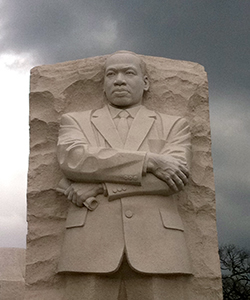The emergence of the Black Lives Matter movement as a reaction to police brutality, the explicit racism of white supremacist movements, and greater awareness of more covert systemic racial bias has helped bring racial inequality to the forefront of public discussion with such impact that commentators often draw parallels to the activism of the mid-twentieth century Civil Rights Movement in America (which at the time also faced widespread resistance and ambivalence). The work and speech of Martin Luther King, Jr., is often referenced, with some encouraging activists to pursue nonviolent protest and to work through existing institutions. Others view this stance as a "sanitized" version of King's activism and seek to follow a path of radical resistance inspired by King’s approach. Most Americans are familiar with the call for freedom and equality in his famous “I Have a Dream” speech, but in his later address “I’ve Been to the Mountaintop” King advocates for a very active, physically engaged form of nonviolence that insists on the right to seek justice through protest marches and economic boycotts, as well as through the court system.
This week the Berkley Forum asks: Why does the call to nonviolence remain compelling in our contemporary era? How do references to Martin Luther King, Jr. in contemporary rhetoric reflect particular understandings of both the Civil Rights Movement and our current struggles? Do the Christian symbolism and scriptural references (both implicit and explicit) in King’s speeches have the same impact on today’s audiences?




